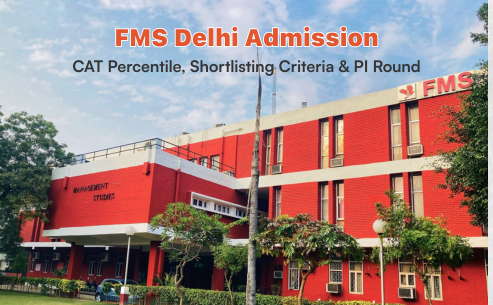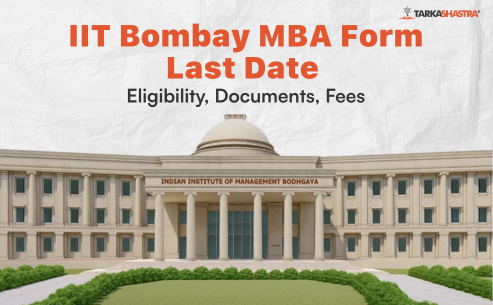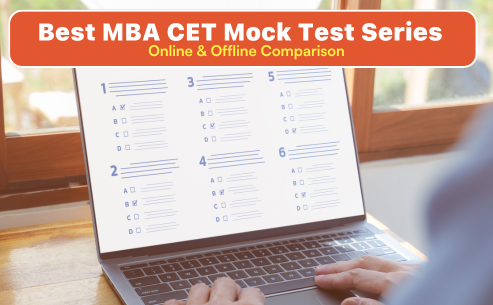Introduction
The Faculty of Management Studies (FMS), Delhi University is one of the most renowned business schools in India with a reputation of being the Red Building of Dreams. FMS Delhi has a brilliant Return on Investment (ROI) which has no competition in the Indian MBA market making it to be the best choice for ambitious CAT aspirants. This is a detailed guide featuring all the details of the fms delhi admission 2026 procedure including CAT percentiles and short listing requirements through the personal interview round, and making your way through it to this prestigious college.
FMS Delhi: The Program That Redefines Value
FMS MBA is a two-year full-time residential program that incorporates academic discipline and practice in the industry. The program is situated in the center of Delhi, which is an advantage of it, given that the corporate headquarters, government institutions, and a flourishing startup ecosystem are located within it.
Key Highlights:
- Duration: 2 years (4 semesters)
- Curriculum: Balanced focus on core management subjects with electives in finance, marketing, operations, and strategy
- Faculty: Renowned scholar and practitioners in the industry
- Location Advantage: There is no better place in the world to get better networking as the central business district of Delhi can offer.
- Alumni Network: More than 7,000 alumni in leadership roles in industries around the world.
- Infrastructure: Contemporary classrooms, rich library and exclusive learning areas.
The only real difference maker is that FMS has a very low fee system and has impressive placement results which has produced an ROI that not many institutions can replicate.
Eligibility Criteria for FMS Delhi 2026
Before diving into the fms delhi admission 2026 process, ensure you meet the basic eligibility requirements:
Academic Qualifications:
- A bachelor’s degree in any discipline from a recognized university
- Minimum 60% aggregate marks for unreserved category (45% for SC/ST/OBC Non-Creamy Layer/PwD/EWS candidates)
- Final-year undergraduate students can also apply provisionally
Important Points:
- No prior work experience is mandatory
- Candidates with work experience do not receive additional weightage in the initial shortlisting
- A valid CAT 2025 score is the only accepted entrance exam for domestic applicants
- International candidates may be admitted through GMAT scores (separate process)
Decoding the FMS CAT Cutoff 2026
Understanding the fms cat cutoff 2026 is crucial for aspirants planning their preparation strategy. Unlike many B-schools, FMS does not release a direct percentile cutoff. Instead, it uses a composite score formula for shortlisting candidates.
Historical CAT Percentile Trends
Based on previous years’ data, here’s what successful candidates have typically scored:
| Category | Expected Overall Percentile | VARC Percentile | DILR Percentile | QA Percentile |
| General | 99+ | 95+ | 95+ | 95+ |
| OBC-NCL | 96 – 98+ | 92+ | 92+ | 92+ |
| SC | 88 – 92+ | 80+ | 80+ | 80+ |
| ST | 85 – 90+ | 75+ | 75+ | 75+ |
| PWD | 85 – 90+ | 75+ | 75+ | 75+ |
The Sectional Balance Imperative
FMS places significant emphasis on sectional percentiles. A candidate with 99.5 overall percentile and low scores in a single section (i.e. 85 percentile) might not be shortlisted, whereas a candidate with 99+ overall and all sectional scores at 95 or above will have a better chance.
Key Insight: It is not simply the total score that matters in shortlisting, but sectional balance is also crucial in fms cat cutoff 2026.
The FMS Delhi Shortlisting Process: How Composite Scores Work
The fms shortlisting process is based on a well tuned mechanism of composite score. It is necessary to comprehend this in order to determine your likelihood of making it to the interview level.
Stage 1: Calculating the Composite Score
FMS applies the weightages below to the CAT 2025 sections in determining the composite score:
- Verbal Ability & Reading Comprehension (VARC): 40%
- Data Interpretation & Logical Reasoning (DILR): 30%
- Quantitative Ability (QA): 30%
Formula: Composite Score = (0.4 × VARC percentile) + (0.3 × DILR percentile) + (0.3 × QA percentile)
Gender Diversity Bonus
In the manner of encouraging gender diversity, FMS assigns 5 additional marks to female candidates in the calculation of composite score. This change is useful in reducing the gender gap and more women are encouraged to take management education.
Example Calculation
Candidate A (Male):
- VARC: 98 percentile
- DILR: 96 percentile
- QA: 97 percentile
- Composite Score = (0.4 × 98) + (0.3 × 96) + (0.3 × 97) = 39.2 + 28.8 + 29.1 = 97.1
Candidate B (Female):
- VARC: 95 percentile
- DILR: 94 percentile
- QA: 95 percentile
- Composite Score = (0.4 × 95) + (0.3 × 94) + (0.3 × 95) + 5 = 38 + 28.2 + 28.5 + 5 = 99.7
This serves as an example of the fact that higher weightage of the VARC and gender diversity bonus can dramatically influence the shortlisting opportunities.
Mastering the FMS Delhi PI Round
Shortlisted candidates then take the fms delhi pi round that has developed over the years. FMS is no longer based on Group Discussions but rather on a more formative assessment as a three-component evaluation.
Components of the Selection Round
1. Personal Interview (PI)
It is the Personal Interview which is the most critical component and it takes up a large portion of your end score. The panel normally comprises 2-3 FMS faculty members.
What to Expect:
- Inquiries about your educational history (undergraduate major, in particular)
- Business and current affairs awareness.
- Questions on your Statement of Purpose.
- Situational and Behavioral questions.
- Talk about your career goals and aspirations.
Preparation Tips:
- Comprehensively rethink ideas of your undergraduate degree.
- Keep up with the latest economic and business potentials.
- Get ready for some standard questions: Why MBA? “Why FMS?” Where do you perceive yourself in 5 years?
- Practice saying things in a straight forward and short manner.
2. Statement of Purpose (SOP)
Applicants are asked to provide a Statement of Purpose explaining their career goals and their suitability to work at FMS.
SOP Guidelines:
- Make it short (usually 300-500 words)
- Have clear short and long term career objectives.
- Discuss the ways the FMS MBA will fit these objectives.
- Bring out distinctive experiences or views you have.
- Do not be generic statements; be authentic and specific.
3. Extempore
The Extempore element is used to examine the skill of thinking on the spot and speaking extempore.
Format:
- You will be assigned a subject (current affairs, abstract concepts or ethical dilemmas).
- Preparation time: 1-2 minutes
- Speaking time: 1-2 minutes
Success Strategies:
- Organize your answer: Introduction, 2-3 points, conclusion.
- Make a firm position on the subject.
- Use examples to support your arguments
- Practice with diverse topics daily
Answer to FAQ: Does FMS conduct a GD or only PI round? FMS has discontinued Group Discussions and now conducts only Personal Interviews, along with Statement of Purpose evaluation and Extempore components.

Want to ace FMS SOP–Extempore–PI?
Prepare for all rounds with expert-led guidance and performance coaching.
FMS Delhi Selection Criteria: The Final Merit List
Understanding the complete fms delhi selection criteria is essential because your final selection depends on multiple factors beyond just the CAT score.
Weightage Breakdown for Final Selection
| Component | Weightage |
| CAT 2025 Score | 50% |
| Class 10th Marks | 10% |
| Class 12th Marks | 10% |
| Statement of Purpose | 10% |
| Extempore | 5% |
| Personal Interview | 15% |
What This Means for You
1. CAT Still Dominates (50%): Your CAT score remains the single most important factor. A strong CAT performance gives you a solid foundation.
2. Academic Consistency Matters (20%): Your 10th and 12th marks together account for 20% of the final score. Strong academic records in school can compensate for a slightly lower CAT score.
3. Interview Performance is Crucial (30%): The combined weightage of SOP (10%), Extempore (5%), and PI (15%) totals 30%, making your interview round performance nearly as important as your CAT score.
Calculation Example
Total Final Score = (0.5 × Normalized CAT Score) + (0.1 × Class 10 percentage) + (0.1 × Class 12 percentage) + (0.1 × SOP Score) + (0.05 × Extempore Score) + (0.15 × PI Score)
This holistic evaluation ensures that FMS selects well-rounded candidates who excel not just in entrance exams but also in academics, communication, and personality.
Key Dates for FMS Delhi Admission 2026
Planning your preparation requires awareness of the important dates in the fms delhi admission 2026 cycle:
| Milestone | Expected Timeline |
| CAT 2025 Registration Opens | August 2025 |
| CAT 2025 Registration Closes | September 2025 |
| CAT 2025 Exam Date | Last Sunday of November 2025 |
| CAT 2025 Results | Second week of January 2026 |
| FMS Application Window Opens | January 2026 |
| FMS Application Deadline | February 2026 |
| Shortlist Announcement | February/March 2026 |
| PI, SOP, and Extempore Rounds | March/April 2026 |
| Final Results Declaration | April/May 2026 |
| Academic Session Begins | July 2026 |
Note: These dates are based on previous years’ patterns. Always refer to the official FMS Delhi website and CAT official portal for confirmed dates.
FMS Delhi Fees and Placements: The Unbeatable ROI
Speaking of fms Delhi fees and placements, the figures speak louder than words and demonstrate why FMS is possibly the most promising ROI in the Indian B-schools.
Fee Structure
- Total Program Fee: Approximately ₹2.00 lakhs for the entire two-year program
- Additional Costs: Hostel fees, mess charges, and other expenses (estimated ₹1.5-2 lakhs per year)
- Total Investment: Around ₹5-6 lakhs for the complete MBA
Placement Highlights (2024 Batch)
- Average CTC: ₹34.1 lakhs per annum
- Median CTC: ₹31 lakhs per annum
- Highest CTC: ₹1.23 crore per annum (International)
- Highest Domestic CTC: ₹84 lakhs per annum
- Top Recruiters: McKinsey & Company, Boston Consulting Group, Bain & Company, Goldman Sachs, JP Morgan, Google, Amazon, HUL, ITC, Accenture Strategy
The ROI Calculation
Investment: ₹6 lakhs (total program cost including living expenses)
Average Starting Salary: ₹34 lakhs per annum
First-Year Return: 5.6x the investment
Compared with the other leading B-schools in which the fee itself is ₹20-30 lakh and the ROI advantage is as clear as crystal. FMS provides high quality education and placement at a quarter of the price.
Sector-Wise Placement Distribution
- Consulting: 35%
- Finance: 25%
- Sales & Marketing: 20%
- General Management: 10%
- Operations & IT: 10%
Additional Information for FMS Aspirants
Intake Capacity
FMS Delhi admits approximately 220-240 students annually to its full-time MBA program. The limited intake ensures personalized attention and strong peer learning.
Reservation Policy
FMS follows the reservation policy of the University of Delhi:
- OBC-NCL: 27%
- SC: 15%
- ST: 7.5%
- PWD: 5% horizontal reservation
- EWS: As per government norms
These reserved category seats are filled based on the composite score ranking within each category.
Accommodation
FMS provides on-campus hostel accommodation for both male and female students. The hostel facilities include:
- Single and double occupancy rooms
- Wi-Fi connectivity
- Common rooms and recreational facilities
- Mess providing three meals a day
- 24/7 security
Conclusion
The fms delhi admission 2026 process requires a balance strategy approach. The key to success lies in the ability to reach a high and balanced score on CAT (usually 99+ percentile with 95 in each of the sections), good academic performance and performance in the personal interview round.
It is important to keep in mind that the selection criteria of FMS is holistic, i.e., though CAT is your ticket, your general personality, ability to communicate, and purposefulness define your final choice. Do it early enough, work on sectional balance in CAT, keep abreast of events, and build a compelling account of your career goals.
Such ROI is unparalleled, and the prestige and opportunities that an FMS degree will provide make the work worth it. You may be with the next generation of FMS Delhi luminous alumni network with the correct preparation strategy and determination.
Frequently Asked Questions (FAQs)
1. What is the CAT 2026 cutoff for FMS Delhi?
FMS Delhi does not release an official percentile cutoff. However, based on historical trends, General category candidates typically need 99+ overall percentile with 95+ in all sections. OBC candidates usually require 96-98+ percentile, while SC/ST candidates need 85-92+ percentile. Remember, FMS emphasizes balanced sectional scores.
2. What is the admission process at FMS?
The admission process involves three stages: First, candidates are shortlisted based on a composite score calculated from their CAT 2025 section-wise percentiles (VARC: 40%, DILR: 30%, QA: 30%). Shortlisted candidates then go through Personal Interview, Statement of Purpose evaluation, and Extempore. Finally, the merit list is prepared using CAT score (50%), 10th marks (10%), 12th marks (10%), SOP (10%), Extempore (5%), and PI (15%).
3. How much weightage is given to the CAT percentile?
CAT score carries 50% weightage in the final selection criteria. Additionally, the CAT score (through the composite score formula) determines whether you get shortlisted for the interview round. This makes CAT the most critical component of the FMS admission process.
4. What are the eligibility criteria for FMS Delhi?
Candidates must have a bachelor’s degree in any discipline from a recognized university with at least 50% aggregate marks (45% for SC/ST/PWD). Final-year students can apply provisionally. A valid CAT 2025 score is mandatory. No work experience is required.
5. Does FMS conduct a GD or only PI round?
FMS has discontinued Group Discussions. The current selection round includes only a Personal Interview, along with Statement of Purpose (SOP) evaluation and an Extempore component where candidates speak on a given topic for 1-2 minutes.
6. What is the weightage for 10th and 12th marks?
Class 10th marks carry 10% weightage and Class 12th marks carry 10% weightage in the final merit list calculation. Together, they account for 20% of your final selection score, making strong school academic records valuable.
7. What are the key dates for FMS admission 2026?
CAT 2025 exam is expected in late November 2025, with results in January 2026. The FMS application window typically opens in January 2026 and closes in February 2026. Shortlists are announced in February/March 2026, with PI rounds in March/April 2026. Final results are usually declared in April/May 2026, with the session beginning in July 2026.
8. What is the intake capacity at FMS Delhi?
FMS Delhi has an annual intake of approximately 220-240 students for its full-time MBA program. This limited batch size ensures personalized attention and strong peer learning opportunities.
9. What is the expected ROI of FMS?
FMS offers exceptional ROI with total program costs of approximately ₹5-6 lakhs (including living expenses) and an average placement package of ₹34+ lakhs per annum. This translates to a first-year return of 5.6x your investment, making it one of the best ROI programs in India.
10. Is there any reservation policy at FMS?
Yes, FMS follows Delhi University’s reservation policy: OBC-NCL (27%), SC (15%), ST (7.5%), PWD (5% horizontal reservation), and EWS (as per government norms). Reserved category candidates are admitted based on composite score ranking within their respective categories.
Disclaimer: The information provided in this guide is based on previous years’ admission trends and publicly available data. Admission criteria, weightages, dates, and cutoffs for the 2026-2028 batch are subject to change. Candidates are strongly advised to regularly check the official FMS Delhi website (www.fms.edu) and CAT official portal for the most current and accurate information regarding the admission process.







